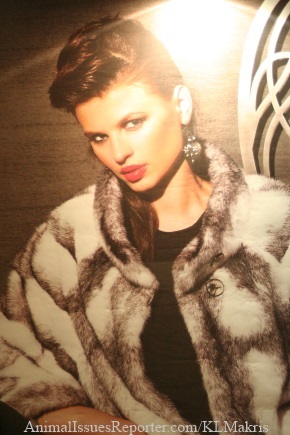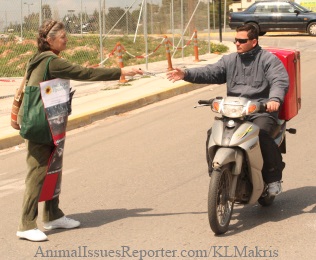European Union should help Greek fur industry workers switch to other trades, says animal advocate
by Katerina Lorenzatos Makris ~
Animal Issues Reporter spoke with Mariza Christodoulou, vice president of the Panhellenic Animal Welfare and Environmental Federation in Greece during a demonstration she helped lead against the “Fur Excellence in Athens 2012,” International Fur Fair.
Christodoulou responded to questions raised earlier by Hellenic Association of Furriers spokesman Nikos Panagiotou.
AIR INTERVIEW WITH MARIZA CHRISTODOULOU, Part 2
Animal Issues Reporter (AIR): A fur industry spokesman said that if the fur trade ended—if you and other animal welfare activists succeeded in your mission to end it—there would be about 40,000 people in the Kastoria region in western Macedonia out of jobs, out of work. What do you see as a solution, if any, for that?
Mariza Christodoulou: Well, there must be a solution for them. We don’t mean for these people to be without jobs. But the European Union government can provide them with money to help them change from one profession to another. Again, this is evolution. How many professions have been changed since 20, 30 years ago? Professions change all the time because this is evolution. Again, the community, the European Union can help them change.
AIR: Another question raised by this gentleman with the fur industry is if the government decides to ban the fur industry, why shouldn’t they also ban meat and dairy and eggs and other uses of animals?
Christodoulou: This is our goal—the ultimate goal, of course—but we cannot ban it all together. We have to take steps in order to give some period of adjustment. You need to have this period of adjustment.
This is our ultimate goal: to recognize the animal rights and not to exploit them, not to eat them, not to wear them, not to confine them in cages in order to sing for you—all these. We mess with their lives. We have to understand that one way or another. We mess with their lives. We don’t let them evolve, we don’t let them be.
AIR: So the goal is to end all the animal use industries, but today you’re focusing on the fur industry. Is that one easier to address in the minds of most people?
Christodoulou: Yes, because it produces a product which is totally useless. We can do without it. People realize that. I mean, ask anybody in the street and you’ll get the same answer. It doesn’t have to be this way. We don’t need that.
AIR: Do you think most Greeks agree with your position on fur?
Christodoulou: I think yes, because if you think about it we were fur-free for quite some years. This fashion now is regaining ground, but it had stopped for 20 years, from let’s say the ‘80s.
AIR: Not by law? It wasn’t illegal?
Christodoulou: Not by law—it was conscience. Not only in Greece but in the whole of Europe. In Germany, if you wear fur, an activist comes near you and sprays the fur. And in the U.K. the movement against fur is very loud, very united.
AIR: But you’re saying here in Greece it came back in the last few years?
Christodoulou: Yes, yes, in the last two years it has come back.
AIR: Why do you think that happened? Especially during an economic crisis?
Christodoulou: They have found a way, a very subtle way, to make you buy without buying the whole fur. I mean you have it on your neck, you have it on your sleeves, you have it as a vest, but not the whole fur. This is a way they’ve found in order to gain ground again.
Another thing is that now with the economic crisis, the fur producers and sellers say, “We have made Greece the first center for fur.” But it’s not the first. I think it’s the second “fur center in entire Europe.”
AIR: From what I understood over the last few days at the Fur Fair, I think they said that the Greek fur trade sector is second only to China’s. There’s Denmark, Finland, they said, but Greece is number two in the world.
Christodoulou: They say, “Look, we have found a way to make you proud of Greece. We export many furs.”
AIR: They said that they are proud that a population of 50,000 people in the Kastoria area of western Macedonia are competing successfully against over a billion people in China, and they are very proud of the quality, the craftsmanship… How do you feel about that, the argument that, “look, it’s a tradition, it goes back centuries?”
Christodoulou: No! This is a tradition that has to stop. This is no way to have a tradition. I’m not proud of this tradition. I’m not proud of the Spanish people who have the tradition with the bull. What does that mean, it’s a tradition? OK, it was some years ago, but now, no, no way. You cannot have it. It’s cruel, it’s inhumane, it’s totally against civilization.
Previous AIR articles on fur:
Animals killed cruelly ‘for money and vanity,’ say fur fair protestors
‘Burn the fur industry,’ say Greek protestors
Fur trade is important to the Greek economy, says industry spokesman
Get fresh AIR! Please click on the SUBSCRIBE button above to receive an email alert when we post new articles on animal issues, including the upcoming ones in our series about the fur industry:
Animals ‘should not be sacrificed on the altar of fashion,’ says fur fair protestor
Full interview with Mariza Christodoulou, Vice President, Panhellenic Animal Welfare and Environmental Federation
Killing animals for fur is just as necessary as killing them for food, says industry spokesman
Full interview with Olga Kikou, Coordinator, Animal Rights Group, Greek Green Party
Fur industry will grow despite animal advocates’ efforts to remove ‘freedom of choice,’ spokesman predicts
Interview with Thorbjørn Schiønning, Anima (Danish animal welfare group)
Visit to a fur farm in Denmark
Interview with Ann-Mona Kulsø Larsen, Nordgaard Fur Farm (Denmark)
Interview with Jan Helleskov, Communications Chief, Magasin du Nord (department store in Copenhagen that no longer sells fur)
Interview with Jens Birger Christensen, CO, Birger Christensen (furrier in Copenhagen)
Visit to Kopenhagen Fur
Katerina Lorenzatos Makris is a career journalist, author, and editor. Credits include hundreds of articles for regional wire services and for outlets such as National Geographic Traveler, The San Francisco Chronicle, Travelers’ Tales, NBC’s Petside.com, and Examiner.com (Animal Policy Examiner), a teleplay for CBS-TV, a short story for The Bark magazine, and 17 novels for Avon, E.P. Dutton, Simon and Schuster, and other major publishers.
Together with coauthor Shelley Frost, Katerina wrote a step-by-step guide for hands-on, in-the-trenches dog rescue, Your Adopted Dog: Everything You Need to Know About Rescuing and Caring for a Best Friend in Need (The Lyons Press).
Please respect copyright law. Sharing AIR links really helps! But copying more than a couple of paragraphs of content without permission is a no-no. If you’d like to use one of AIR’s articles or one of our photographs, kindly contact us at [airinfo AT yahoo DOT com].
Copyright © 2014 Animal Issues Reporter and AnimalIssuesReporter.com.
All rights reserved.


Leave a Reply